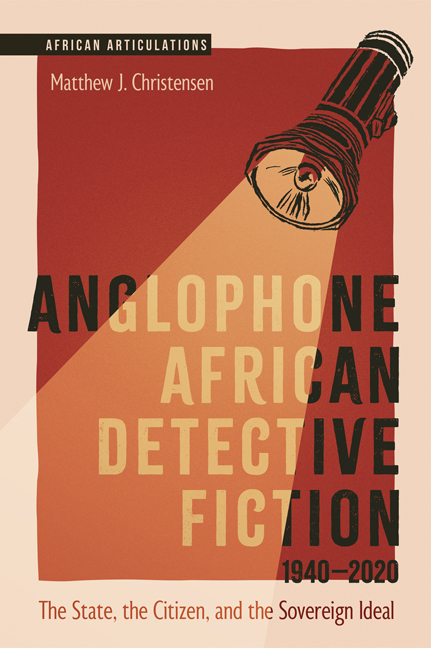Book contents
- Frontmatter
- Dedication
- Contents
- List of Illustrations
- Acknowledgements
- Introduction
- Part 1 Africanizing Detective Fiction’s Un/Sovereign Subjects
- Part 2 Neoliberal Noir
- Conclusion: The Future Imperfect
- An Anglophone African Detective Fiction Bibliography, 1940–2023
- Bibliography
- Index
- Miscellaneous Endmatter
Conclusion: The Future Imperfect
Published online by Cambridge University Press: 11 May 2024
- Frontmatter
- Dedication
- Contents
- List of Illustrations
- Acknowledgements
- Introduction
- Part 1 Africanizing Detective Fiction’s Un/Sovereign Subjects
- Part 2 Neoliberal Noir
- Conclusion: The Future Imperfect
- An Anglophone African Detective Fiction Bibliography, 1940–2023
- Bibliography
- Index
- Miscellaneous Endmatter
Summary
The locked-room mystery typically comes to its dramatic close with the detective gathering everyone together to reveal the identity of the culprit. To the captive audience the detective tells two stories. The first is that of the murderer's motivation and sequence of actions leading up to the seemingly perfect crime. The second is that of the detective's own investigation and reasoning through of the available evidence. This moment in the locked-room whodunit is, in Robert Champigny's (1977) formulation, the twinned story of ‘what will have happened’. Champigny explains that it is the narrative equivalent of the grammatical future perfect in which the detective explains what will have happened in the lead up to the crime and what will have happened in the lead up to the detective's astonishing revelation. This narrative grammar puts the reader in the present tense of the moment of the crime's initial conception rather than that of the crime or the solution. From that temporal position, the detective, the gathered suspects, and the reader look forward in time to the execution of the murder and to the revelation of the murderer's identity, which is to say that it anticipates the moment of justice achieved. Few locked-room mysteries populate the history of Anglophone African detective fiction, and the few that do can hardly be argued to conform with the classic whodunits of Poe, Doyle, or Sayers. But it seems fitting to end this study of detective fiction by African writers with an analogous accounting of what will have happened to make the detective genre so productive for engaging with the problematics of the state, selfhood, and sovereignty, and for anticipating futures beyond them. What follows requires me to revisit and review a few key details that should be familiar by now but hopefully this denouement will fit the puzzle pieces into a clearer whole.
From the earliest experiments in the 1940s and 1950s, the story of Anglophone African detective fiction has been, at its most basic, a narrative of writers establishing and extending the boundaries of the detective story to make it serve African realities. As just a few examples indicate, African writers have been, and remain, endlessly innovative in domesticating the detective story for local, regional, and Africa-wide audiences.
- Type
- Chapter
- Information
- Anglophone African Detective Fiction 1940-2020The State, the Citizen, and the Sovereign Ideal, pp. 185 - 192Publisher: Boydell & BrewerPrint publication year: 2024



